- Campaign
Literature « 1988
Republican Presidential Primary «
Dole for President
1988 Republican Presidential Primary
Dole for President
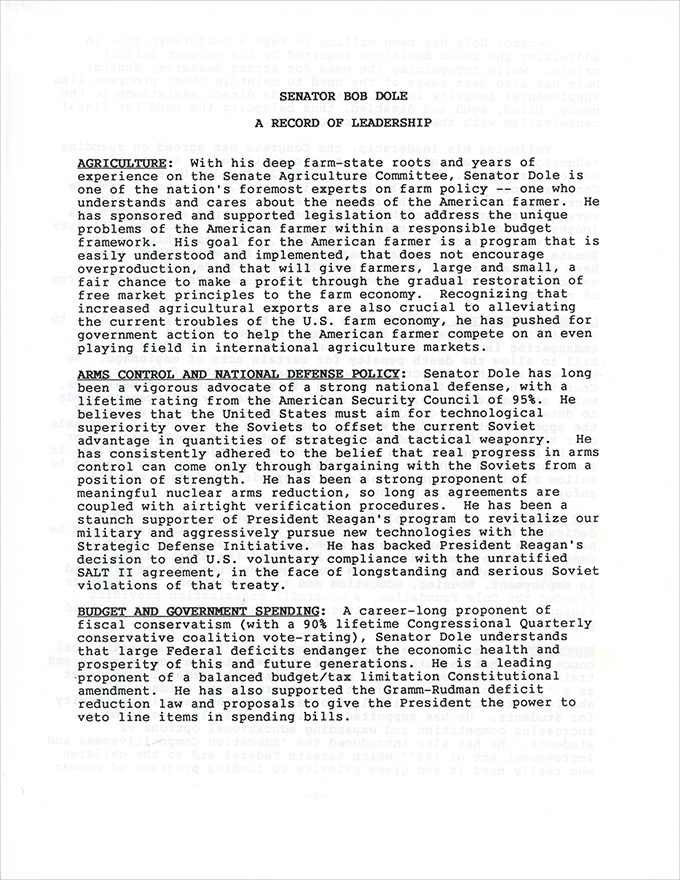 |
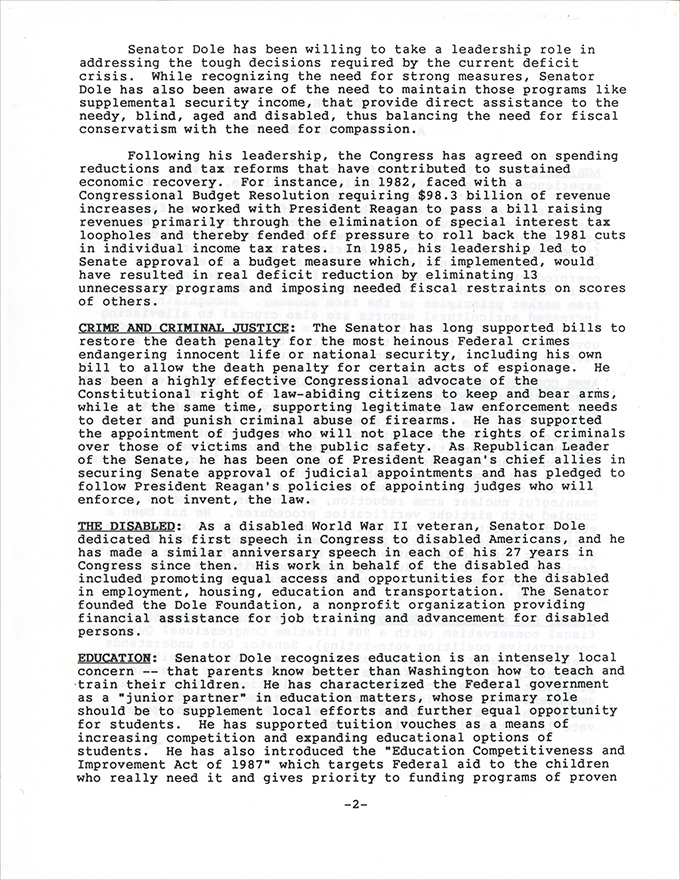 |
||
| "Record
of Leadership" (5 pages) |
SENATOR BOB DOLE
A RECORD OF LEADERSHIP
AGRICULTURE: With his deep farm-state roots and years of experience on the Senate Agriculture Committee, Senator Dole is one of the nation's foremost experts on farm policy -- one who understands and cares about the needs of the American farmer. He has sponsored and supported legislation to address the unique problems of the American farmer within a responsible budget framework. His goal for the American farmer is a program that is easily understood and implemented, that does not encourage overproduction, and that will give farmers, large and small, a fair chance to make a profit through the gradual restoration of free market principles to the farm economy. Recognizing that increased agricultural exports are also crucial to alleviating the current troubles of the U.S. farm economy, he has pushed for government action to help the American farmer compete on an even playing field in international agriculture markets.
ARMS CONTROL AND NATIONAL DEFENSE POLICY: Senator Dole has long been a vigorous advocate of a strong national defense, with a lifetime rating from the American Security Council of 95%. He believes that the United States must aim for technological superiority over the Soviets to offset the current Soviet advantage in quantities of strategic and tactical weaponry. He has consistently adhered to the belief that real progress in arms control can come only through bargaining with the Soviets from a position of strength. He has been a strong proponent of meaningful nuclear arms reduction, so long as agreements are coupled with airtight verification procedures. He has been a staunch supporter of President Reagan's program to revitalize our military and aggressively pursue new technologies with the Strategic Defense Initiative. He has backed President Reagan's decision to end U.S. voluntary compliance with the unratified SALT II agreement, in the face of longstanding and serious Soviet violations of that treaty.
BUDGET AND GOVERNMENT SPENDING: A career-long proponent of fiscal conservatism (with a 90% lifetime Congressional Quarterly conservative coalition vote-rating), Senator Dole understands that large Federal deficits endanger the economic health and prosperity of this and future generations. He is a leading proponent of a balanced budget/tax limitation Constitutional amendment. He has also supported the Gramm-Rudman deficit reduction law and proposals to give the President the power to veto line items in spending bills.
Senator Dole has been willing to take a leadership role in addressing the tough decisions required by the current deficit crisis. While recognizing the need for strong measures, Senator Dole has also been aware of the need to maintain those programs like supplemental security income, that provide direct assistance to the needy, blind, aged and disabled, thus balancing the need for fiscal conservatism with the need for compassion.
Following his leadership, the Congress has agreed on spending reductions and tax reforms that have contributed to sustained economic recovery. For instance, in 1982, faced with a Congressional Budget Resolution requiring $98.3 billion of revenue increases, he worked with President Reagan to pass a bill raising revenues primarily through the elimination of special interest tax loopholes and thereby fended off pressure to roll back the 1981 cuts in individual income tax rates. In 1985, his leadership led to Senate approval of a budget measure which, if implemented, would have resulted in real deficit reduction by eliminating 13 unnecessary programs and imposing needed fiscal restraints on scores of others.
CRIME AND CRIMINAL JUSTICE: The Senator has long supported bills to restore the death penalty for the most heinous Federal crimes endangering innocent life or national security, including his own bill to allow the death penalty for certain acts of espionage. He has been a highly effective Congressional advocate of the Constitutional right of law-abiding citizens to keep and bear arms¡ while at the same time, supporting legitimate law enforcement needs to deter and punish criminal abuse of firearms. He has supported the appointment of judges who will not place the rights of criminals over those of victims and the public safety. As Republican Leader of the Senate, he has been one of President Reagan's chief allies in securing Senate approval of judicial appointments and has pledged to follow President Reagan's policies of appointing judges who will enforce, not invent, the law.
THE DISABLED: As a disabled World War II veteran, Senator Dole dedicated his first speech in Congress to disabled Americans, and he has made a similar anniversary speech in each of his 27 years in Congress since then. His work in behalf of the disabled has included promoting equal access and opportunities for the disabled in employment, housing, education and transportation. The Senator founded the Dole Foundation, a nonprofit organization providing financial assistance for job training and advancement for disabled persons.
EDUCATION: Senator Dole recognizes education is an intensely local concern -- that parents know better than Washington how to teach and train their children. He has characterized the Federal government as a "junior partner" in education matters, whose primary role should be to supplement local efforts and further equal opportunity for students. He has supported tuition vouches as a means of increasing competition and expanding educational options of students. He has also introduced the "Education Competitiveness and Improvement Act of 1987" which targets Federal aid to the children who really need it and gives priority to funding programs of proven effectiveness. The bill would encourage partnerships between schools and the private sector to structure education programs that will make for a more competitive workforce.
THE ELDERLY: As Chairman of the Senate Finance Committee, Senator Dole introduced and shepherded to enactment the 1983 bipartisan plan that rescued the system from financial insolvency. He was also a principal sponsor of private pension reform legislation enacted in 1984 to improve the treatment of homemakers and employees who work intermittently because of family responsibilities. As early as 1979, he sponsored a bill to expand Medicare health coverage to include catastrophic illness and in the current Congress, has introduced and cosponsored measures that will dramatically limit out-of-pocket costs for most services for the elderly. He has also urged the Congress to examine ways to address the ever-increasing need for long term care for the elderly, while supporting responsible efforts to keep costs under control and health care affordable for the elderly and all Americans.
ENERGY AND ENVIRONMENT: Economic progress and national security require a secure and affordable supply of energy. At the same time, legitimate concerns for preserving the environment must be addressed. As a member of the Senate Finance Committee, Senator Dole has led efforts to ensure necessary incentives to stimulate domestic oil and gas production, the development of alternative sources of energy, and has called for a broad mix of energy sources and market solutions to ensure an abundant supply of domestically produced energy, while supporting reasonable regulations to protect the environment.
FOREIGN POLICY: Senator Dole has consistently espoused and worked for a tough, realistic, bipartisan foreign policy. In dealing with Moscow, he believes that we must be militarily strong and politically united. At the top of his agenda for U.S.-Soviet relations are: Soviet aggression and meddling around the globe; human rights violations within the USSR's own borders; and nuclear arms reduction. He has supported lawful measures to aid legitimate, responsible freedom fighter organizations. He has pressed for inclusion of the security needs of NATO and our Asian allies into U.S. positions on strategic and arms control issues. He advocates broader strategic cooperation with Israel and sees bilateral peace talks between Israel and its adversaries as the key to Middle East peace. He favors continued expansion of economic relations with China and cooperation on strategic questions where our interests are parallel. He has supported policies of growth for developing nations. He regards the problems of terrorism, illegal drugs and the growing menace of AIDS as urgent and international in scope, demanding both concerted unilateral U.S. action and multilateral cooperation.
HEALTH CARE: As one who has had the benefit of the finest health care system in the world, Senator Dole is well aware of the vital role access to health care services plays in our lives.
As a leader on the Senate Finance Committee, he has worked to preserve the private health care system, while also being involved in efforts to increase the availability of maternal and child health services, as well as home health services and hospice care for the elderly. A long-time advocate of nutrition programs for the poor, the unborn, and the disadvantaged, he has continually supported efforts to provide these critical preventive services. As a founding member of the Senate rural health caucus, he sponsored a bill to provide higher rates of reimbursement to rural hospitals to assure continued access to quality care in rural America. He has been a leading proponent of a presidential commission on Acquired Immunity Difficiency Syndrome (AIDS) to address that crisis, believing that a balance should be followed to both help those stricken with the disease and protect those not infected.
SOCIAL ISSUES: Senator Dole's record on social issues has reflected a deep abiding respect for the sanctity of human life and the inviolability of individual rights, values, and freedoms. He has been a long time supporter of a Constitutional amendment to permit voluntary prayer in public schools in an atmosphere of pluralism and free expression for all. He has long opposed Federal funding of abortion, except where the mother's life is endangered, and has called for a Constitutional amendment to overturn the Roe v Wade decision which allowed abortion on demand. In the tradition of his Party, he has actively supported Federal civil rights legislation and has been a particularly strong proponent of equal access in voting. Consistent with his abhorrence of discrimination, he has opposed the use of quotas as reverse discrimination.
TAXES AND JOB CREATION: As a senior member of the Senate Finance Committee and Chairman of that body from 1981-85, Senator Dole has championed fiscal responsibility and tax fairness for working Americans. In 1981 he introduced and shepherded to enactment President Reagan's Economic Recovery Tax Act which dramatically cut tax rates on individual earnings, savings, and investments and led to the creation of millions of new jobs for Americans. In 1982, working with the Reagan Administration, he secured enactment of a tax fairness measure that became the predecessor of the historic tax simplication bill of 1986. He was the author of the tax code provision to index individuals' income tax rates to prevent unlegislated tax increases and "bracket creep" caused by inflation. Staunchly opposed to reducing the deficit through raising individual tax rates, he has sponsored a resolution to preserve the lower income tax rates set by the 1986 tax reform law.
TRADE AND ECONOMIC DEVELOPMENT: Senator Dole has been an ardent and articulate proponent of action to reduce the burgeoning U.S. trade deficit. He has supported a "free market" policy, but has also recognized that the U.S. must respond when trading partners engage in unfair practices to the detriment of American industry and jobs. He has recommended a four-point program for promoting American competitiveness and to deal with the trade deficit, including: strong action against nations that erect market barriers to U.S. products; tougher trade statutes that assure relief to industries injured by unfair trade practices; addressing the broader economic issues that contribute to trade imbalances, such as the budget deficit; and enhancing American competitiveness through improvements in research, education, labor-management cooperation, and regulatory reform.
VETERANS: Well acquainted with veterans' needs, Senator Dole spent 39 months recovering from massive injuries he received from enemy mortar while leading a platoon of the 10th Mountain Division in World War II. For his service, he received the Bronze Star and the Purple Heart. He has included compensation benefits for disabled veterans and continuation of GI Bill educational benefits among his budget priorities, while supporting and encouraging efforts to make all Federal benefits programs more streamlined and efficient to help bring burgeoning deficits under control. His efforts on issues concerning former POWs and MIAs have drawn praise. Recognition of the Senator's many other contributions has resulted in awards such as the VFW's prestigious Congressional Award and Paralyzed Veterans of America's Schweikert Disability Awareness Award.
WELFARE: Senator Dole has consistently adhered to the belief that people at the grass roots level can usually fashion better ways to meet the human needs of their communities than can Washington's bureaucracy. At the same time, as a product of depression-era Kansas and a World War II vet, he is sensitive to the fact that there are times when the government needs to step in and lend a hand. He has supported Federal programs designed to help those in· true need and has been particularly active in behalf of the Food Stamp program, securing reforms in that program which have greatly improved its effectiveness and efficiency. He has been at the forefront of welfare reform and supports efforts to give states more latitude in experimenting with innovative ways to get people into meaningful, productive jobs and off of Federal assistance.
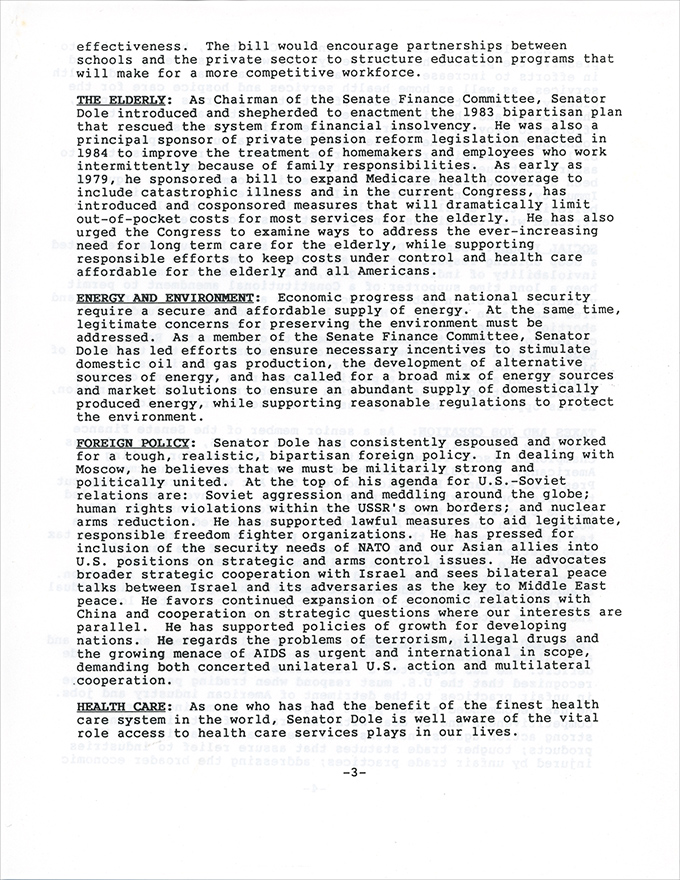 |
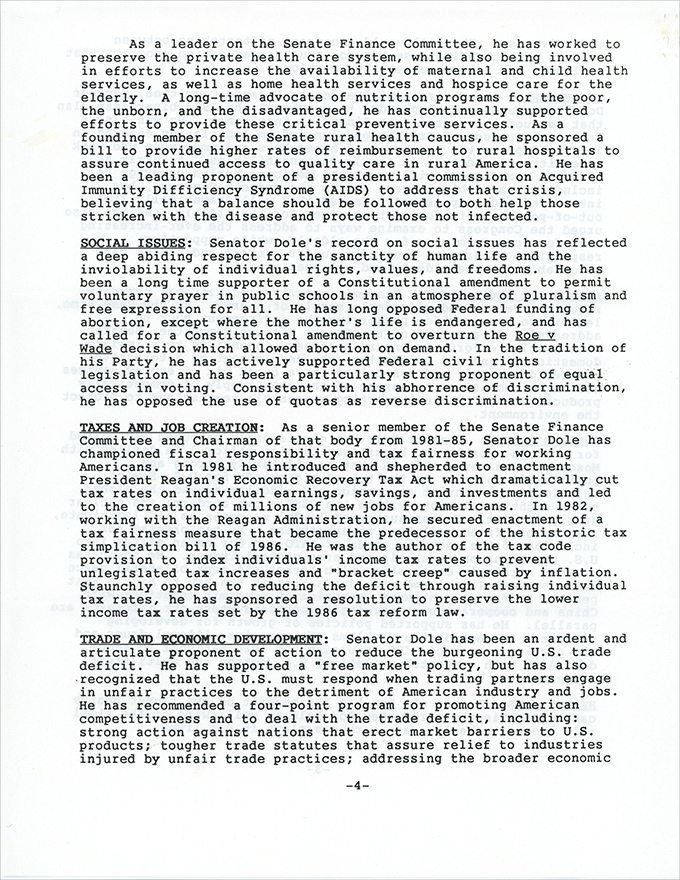 |
||
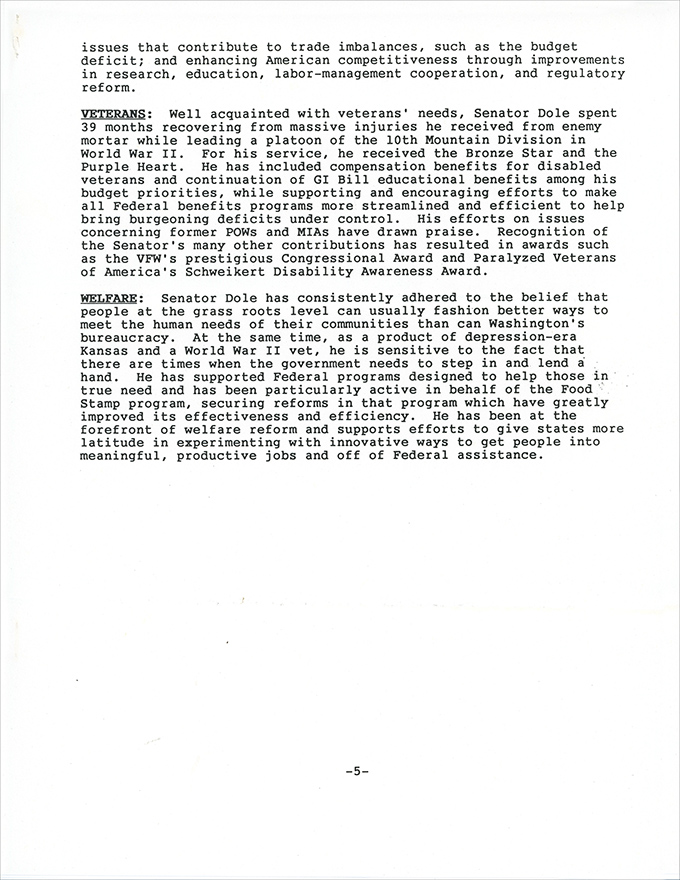 |
ed. note: includes a couple of typos: Difficiency, simplication |

